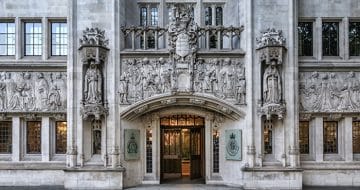Unanimous decision

The UK’s top court has found that the Scottish parliament does not have the power to legislate for a referendum on Scottish independence.
The issue arose after the Scottish Independence Reference Bill was drafted by the Scottish National Party which is the largest political party in Scotland. The bill makes provision for a referendum on the question, “Should Scotland be an independent country?”.
The Supreme Court heard submissions on the 11 and 12 October with the case turning on whether the power to legislate for a referendum had been devolved by the UK Parliament or reserved under the Scotland Act 1998.
Having initially stated at the start of the hearing that it was “likely to be some months” before a judgment was delivered, the five-strong panel of Supreme Court justices (Lord Reed, Lord Lloyd-Jones, Lord Sales, Lord Stephens, Lady Rose) handed down their ruling in just six weeks.
The court explained that a provision will relate to a reserved matter if it has something more than a loose or consequential connection with the matters listed under section 29(2)(b) Scotland Act 1998.
In a unanimous judgment, it found that “it is plain that a Bill which makes provision for a referendum on independence — on ending the Union — has more than a loose or consequential connection with the Union of Scotland and England.”
Further submissions based on the right to self–determination in international law and the principle of legality made by the SNP were also rejected by the Supreme Court. You can read the full judgment here.
This means that the provision of ‘indyref2’ will have to go through Westminster unless the definition of reserved matters is modified.
First Minister of Scotland and leader of the SNP said she respected the Supreme Court’s ruling, adding:
“A law that doesn’t allow Scotland to choose our own future without Westminster consent exposes as myth any notion of the UK as a voluntary partnership & makes case for Indy. Scottish democracy will not be denied. Today’s ruling blocks one route to Scotland’s voice being heard on independence — but in a democracy our voice cannot and will not be silenced.”
A full statement from the First Minister is expected later this morning.

